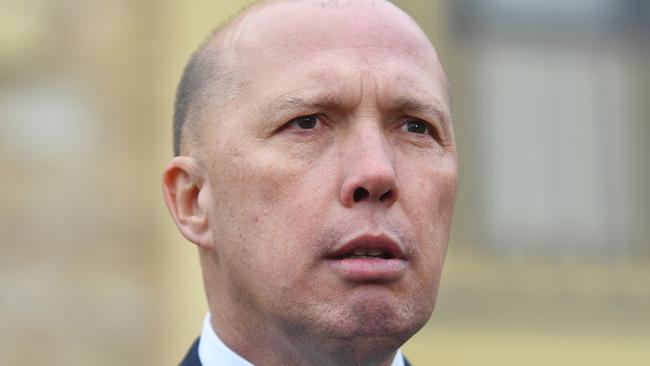Eric Schwartz: No need for Peter Dutton to ‘out-Trump’ US on migration

I was disheartened and dismayed by inaccurate and politically provocative remarks of Peter Dutton, Australia’s Minister of Home Affairs, and by his suggestion that Australia would not support the recently-finalised UN Global Compact for Safe, Orderly and Regular Migration.
As a former US diplomat who has served in two presidential administrations, I have had the distinct pleasure and privilege of working with Australian officials on many key issues over the past decades. I deeply appreciate the close relationship between our two countries, and know how much both governments have sought to align policies and perspectives on any number of issues.
But it is both baffling and disturbing that Minister Dutton has chosen to parrot the Trump administration’s fearmongering statements and positions on the migration compact. In determining how to move forward in addressing international migration — both a global challenge and a key opportunity — the Australian public must not allow its perspectives to be swayed by misrepresentations based on evidence-free analysis.
First, and contrary to Minister Dutton’s statements, the compact does not insist that Australia surrender its border protection policies or its sovereignty to anyone. Rather, the compact is a non-binding cooperative framework drafted by states themselves. Its provisions were developed in an intergovernmental process that took place over the course of six sets of negotiations with the contributions of a broad range of stakeholders including the private sector and civil society — not to mention the government of Australia.
At the core of the compact is the acknowledgment that no country can address transboundary migration challenges alone. This, of course, is self-evident, but it is still a very reasonable idea to articulate this principle as a means to promote co-operation among states. Indeed, the compact aims to foster such co-operation, dialogue, and shared interests while fully respecting state sovereignty.
There is nothing in the text to support the Minister’s contention that the compact impinges on Australia’s sovereignty. In fact, one of the document’s guiding principles reaffirms “the sovereign right of States to determine their national migration policy and their prerogative to govern migration within their jurisdiction, in accordance with international law.”
The document does not impose any new legal obligations on Australia. Grounded in international human rights law instruments to which Australia has long been a signatory, the compact aims to foster good practices in border management such as respecting family unity, the rights of children, due process of law, and international co-operation to combat trafficking in persons. The compact places a premium on actions necessary to avoid the tragic loss of life and inhumane practices which occur in the absence of mutual understanding and co-operation among states. As the very title of the compact suggests, its intent is to promote migration that is “safe, orderly, and regular,” as opposed to unsafe, disorderly, and irregular. It is an aspirational document that seeks to ensure that international migration inures to the benefit of all — counties of origin and destination, and migrants and the communities that receive them.
To be sure, some of those non-binding provisions will provoke discussion and debate in Australia and elsewhere around the world, as indeed they should as governments collectively seek to determine how best to address migration management objectives in a manner that is neither brutal nor inhumane. So, for example, while the draft document recognises that migrants may be lawfully detained, it also states that detention should take place in accordance with due process and not be arbitrary. Recognising the threat to human rights that detention can present, it also provides that governments will use detention as a last resort and work toward alternatives — especially in the case of children and families. There is no reason on earth that any Australian government should object to these sorts of aspirational objectives.
As reflected in a report issued earlier this year by Australia’s Treasury and Minister Dutton’s own Department of Home Affairs, migration has had a significantly positive economic impact on Australia, and has played a key role in enabling the country to avoid demographic challenges related to an ageing population. Moreover, at a time when many governments of the world are advocating for abusive migration policies based on fear and xenophobia, Australia need not attempt to “out-Trump” the Trump administration on migration.
Rather, Australia should be playing a leadership role in encouraging approaches that are informed by human rights, reason, and best practices — without sacrificing enforcement imperatives or national sovereignty. In this respect, support for the global compact on migration would be wholly consistent with the values of democracy and tolerance that Americans and others around the world have long associated with your great country.
Eric P. Schwartz is president of Refugees International and a former U.S. Assistant Secretary of State for Population, Refugees, and Migration from 2009 to 2011 and a former Special Assistant to President Clinton for National Security Affairs (1996-2000).



